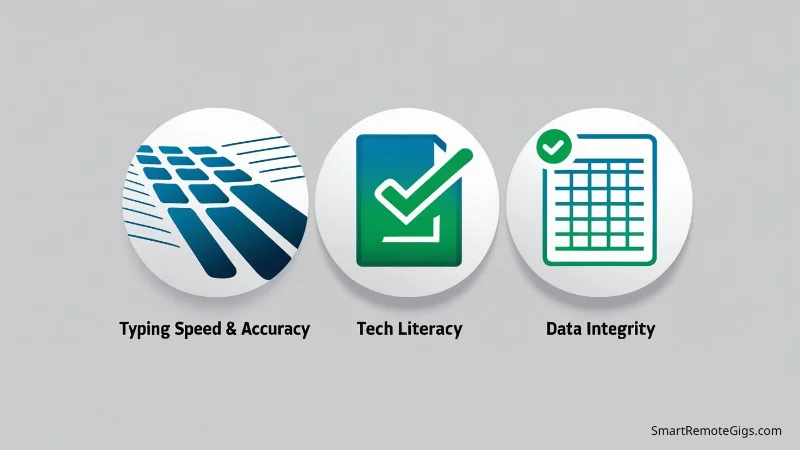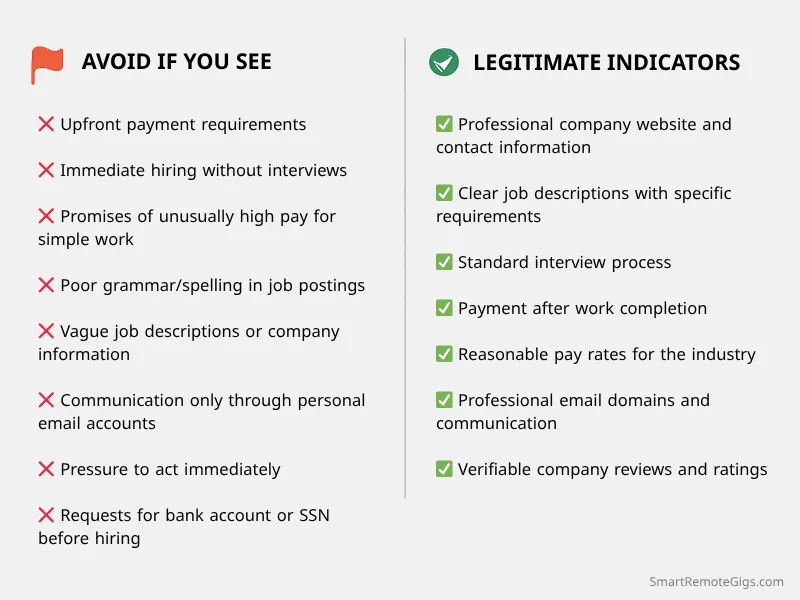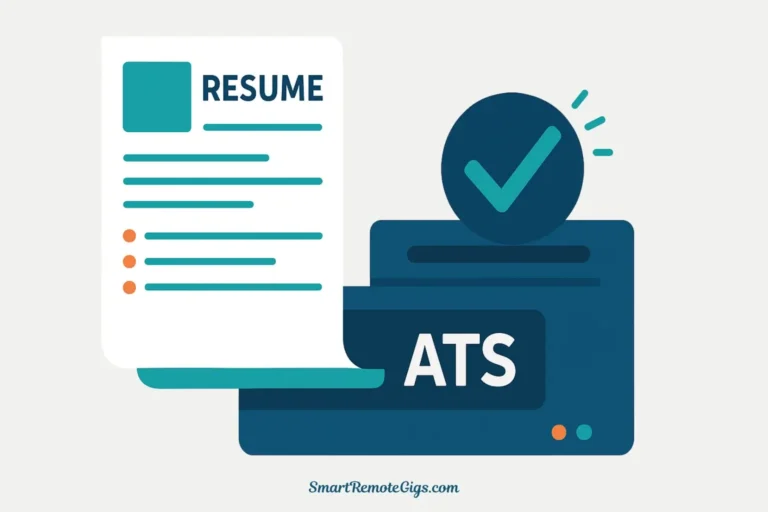The entry-level data entry jobs market is flooded with both legitimate opportunities and dangerous scams. While this field offers genuine work-from-home possibilities for beginners, success requires knowing where to look, what skills to develop, and most importantly, how to protect yourself from fraudulent schemes.
This comprehensive guide prioritizes your safety while providing tactical advice to improve your speed, accuracy, and earning potential. By the end, you’ll have a clear roadmap to finding legitimate data entry work and building valuable skills that can launch your remote career.
Ready to Start Your Data Entry Career? Let’s Find Legitimate Work
Our complete guide to remote jobs without experience highlighted data entry as a top direct-entry opportunity. Now, let’s get you hired safely. This guide provides a vetted list of companies that hire beginners and, most importantly, teaches you how to spot the scams that flood this field.
Work from home data entry positions offer flexibility and accessibility, but the industry’s low barrier to entry attracts both legitimate employers and sophisticated scammers. Understanding the difference can save you time, money, and personal information while fast-tracking your path to genuine employment.
The legitimate data entry industry employs thousands of remote workers who process everything from survey responses to medical records. These positions typically pay $12-18 per hour for beginners, with experienced professionals earning $20+ per hour for specialized work requiring industry knowledge or advanced technical skills.
What It Takes: The Essential Data Entry Skill Set

Successful data entry professionals possess a combination of technical abilities and a detail-oriented mindset that goes far beyond basic typing. Mastering these three areas will set you apart from other candidates.
Skill 1: Typing Speed & Accuracy (The Foundation)
Skill Level | Words Per Minute | Accuracy Rate |
|---|---|---|
Minimum requirements | 40+ WPM | 95% accuracy |
Professional level | 60+ WPM | 98% accuracy |
Advanced level | 80+ WPM | 99% accuracy |
Speed without accuracy is worthless in data entry work. Most employers prefer candidates who type 50 WPM with perfect accuracy over those who type 70 WPM with frequent errors. Accuracy directly impacts productivity since correcting mistakes takes significantly more time than typing correctly initially.
Practice Resources:
- KeepReading.com – Free typing tests with detailed analytics
- Typing.com – Structured lessons and progress tracking
- 10FastFingers – Competitive typing tests and games
💡 Improvement Strategy: Practice 15-20 minutes daily focusing on accuracy first, then gradually increase speed. Use proper finger positioning and maintain consistent rhythm rather than rushing through exercises.
Skill 2: Tech Literacy (The Essential Tools)
Basic Spreadsheet Proficiency Every data entry professional must master fundamental spreadsheet operations in both Microsoft Excel and Google Sheets. This includes data formatting, basic formulas, sorting, filtering, and cell navigation shortcuts.
Essential Excel Functions:
- Data Validation: Ensuring input accuracy through dropdown lists and restrictions
- VLOOKUP: Cross-referencing data between different sheets or databases
- Pivot Tables: Summarizing and analyzing large datasets (required for advanced positions)
- Conditional Formatting: Highlighting errors or important data automatically
- Text Functions: Cleaning and standardizing text data (TRIM, PROPER, CONCATENATE)
Database Basics Many positions require familiarity with customer relationship management (CRM) systems, inventory databases, or specialized industry software. While specific training is usually provided, understanding database concepts like records, fields, and queries demonstrates professional readiness.
File Management Systems Professional data entry involves organizing files logically, following naming conventions, and maintaining version control. Learn to work with cloud storage platforms (Google Drive, Dropbox, OneDrive) and understand folder hierarchy systems.
Skill 3: Data Integrity (The Professional Mindset)
Quality Control Processes Develop systematic approaches to verify data accuracy before submission. This includes cross-referencing source documents, using spell-check tools, and implementing personal review procedures that catch common errors.
Pattern Recognition Experienced data entry professionals quickly identify inconsistencies, duplicate entries, and potential errors. Train yourself to notice when data doesn’t follow expected patterns or when entries seem unusually formatted.
Documentation Skills Many positions require detailed notes about data sources, processing procedures, or exceptions encountered. Strong written communication skills and systematic documentation habits are essential for career advancement.
Staying Safe: How to Spot and Avoid Data Entry Scams

Online data entry scams are rampant because they target beginners. Understanding their playbook is the single most important step you can take to protect your finances and personal information.
The 5 Most Common Scams to Avoid
Scam #1: The Fake Check Scam
How it works: You’re “hired” immediately and sent a check for supplies or software. You’re instructed to deposit the check and wire money to a “vendor” for equipment or training materials.
The reality: The check is fraudulent. When it bounces (which can take weeks), you’re responsible for the full amount plus bank fees. The “vendor” is the scammer, and your wired money is gone forever.
Red flags:
- Immediate hiring without interview
- Upfront payment requests
- Check amounts exceeding stated costs
- Pressure to act quickly
Scam #2: The “Pay for Training” Scam
How it works: Companies advertise high-paying data entry positions but require payment for “certification,” “training materials,” or “software licenses” before you can start working.
The reality: Legitimate employers provide all necessary training and tools at no cost. These scammers collect fees and either disappear or provide worthless materials with no actual job opportunities.
Scam #3: The Identity Theft Scam
How it works: Fake employers request extensive personal information including Social Security numbers, bank account details, or copies of identification documents before the interview process.
The reality: This information is sold to identity thieves or used to open fraudulent accounts in your name. Legitimate employers only request this information after hiring for tax and payroll purposes.
Scam #4: The Overpayment Scam
How it works: After being “hired,” you receive a check for more than your agreed salary with instructions to return the excess amount or forward it to another party.
The reality: The original check is fraudulent. When it bounces, you’re liable for the entire amount, including any money you’ve already sent to third parties.
Scam #5: The Multi-Level Marketing Disguise
How it works: “Data entry” positions that require recruiting others or selling products to earn significant income. These often involve processing your own sales data or customer information.
The reality: These are MLM schemes disguised as data entry jobs. Most participants lose money, and the “data entry” component is minimal compared to sales and recruitment expectations.
Your Red Flag Checklist: Legitimate vs. Scam Indicators

For comprehensive protection strategies, see our complete guide to spotting and avoiding remote job scams — Coming Soon
Where to Find Legitimate Data Entry Jobs
Now that you know how to stay safe, let’s focus on where to find real opportunities. Legit data entry jobs exist across multiple industries and company types. This curated list focuses on established companies with verified hiring practices and positive employee reviews.
Vetted Company & Platform List
Reputable Micro-Task Platforms
Platform | What They Offer | Pay Range | Pros | Cons |
|---|---|---|---|---|
Clickworker | Short data entry tasks, content creation, research projects | $9-15/hr | Flexible scheduling, variety of work types, reliable payments | Income inconsistency, competitive task availability |
Lionbridge | Search engine evaluation, data collection, content review | $12-18/hr | Long-term project availability, above-average compensation | Strict quality requirements, limited regional availability |
Appen | AI training data, transcription, social media evaluation | $10-16/hr | Global opportunities, skill development potential | Project-based work with gaps between assignments |
Established BPO Companies
Company | Specialization | Pay Range | Requirements | Key Benefits |
|---|---|---|---|---|
Axion Data Services | Healthcare data entry, insurance processing, legal transcription | $11-16/hr | High school diploma, typing test, background check | Employee-focused culture, comprehensive training |
DionData Solutions | Survey data processing, market research, customer database management | $12-18/hr | Associate degree preferred, excellent attention to detail | Healthcare options for full-time, performance bonuses |
ModSquad | Social media management, customer service, content moderation | $15-20/hr | College degree, strong communication skills, social media experience | Collaborative team structure, industry specialization opportunities |
How to Use General Job Boards Safely (Indeed & LinkedIn)
Use specific keywords to find legitimate opportunities while avoiding scam-heavy generic searches:
Effective search terms:
- “Data clerk” + “remote”
- “Records management” + “work from home”
- “Administrative assistant” + “data entry”
- “Customer database” + “remote entry”
Company research checklist:
- Verify company website and physical address
- Check Better Business Bureau ratings
- Read employee reviews on Glassdoor
- Confirm company presence on professional networks
- Verify job posting legitimacy through direct company contact
💼 FlexJobs Premium Advantage
FlexJobs screens all listings for legitimacy, making it worth the subscription cost for serious job seekers. Their data entry category features verified remote positions from established companies with transparent hiring processes.
A Day in the Life of a Remote Data Entry Clerk

Understanding typical work from home data entry workflows helps set realistic expectations and prepare for success in your first position.
Morning Setup and Task Assignment
8:00 AM – Daily Check-in Most remote data entry positions begin with checking email for new assignments, priority changes, or quality feedback from previous work. You’ll typically receive a batch of records to process with specific formatting requirements and deadline information.
8:15 AM – Workspace Preparation Set up your dual monitors (if available), organize source documents, and open necessary software applications. Professional data entry requires a distraction-free environment with reliable internet and backup power sources.
8:30 AM – Quality Review of Instructions Carefully read all project specifications, noting formatting requirements, validation rules, and submission procedures. This upfront investment prevents costly errors that require rework.
Core Work Period: Processing and Quality Control
9:00 AM – 12:00 PM – Primary Data Processing Focus on steady, accurate data entry while maintaining consistent rhythm. Professional workers typically process 200-400 records per hour depending on complexity, taking short breaks every 45-60 minutes to maintain accuracy.
Data validation procedures:
- Cross-reference source documents for accuracy
- Use spell-check and data validation tools
- Flag unusual entries for supervisor review
- Maintain detailed logs of processed records
12:00 PM – 1:00 PM – Quality Control Review Review morning work for errors, inconsistencies, or formatting issues. This systematic approach catches mistakes before submission and demonstrates professional standards to supervisors.
Afternoon Productivity and Communication
1:00 PM – 4:00 PM – Continued Processing Afternoon sessions often involve more complex records or specialized tasks requiring additional attention. Maintain communication with supervisors about progress and any issues encountered.
4:00 PM – 5:00 PM – Final Review and Submission Complete final quality checks, organize completed work according to submission requirements, and update progress tracking systems. Prepare summary reports highlighting any exceptions or concerns discovered during processing.
Professional Development Activities
📚 End-of-day learning: Spend 15-30 minutes improving relevant skills through online tutorials, typing practice, or industry-specific training. Continuous improvement leads to higher-paying opportunities and career advancement.
🎯 Weekly goal setting: Track productivity metrics, accuracy rates, and learning objectives. Successful data entry professionals treat their role as a stepping stone to more advanced administrative or analytical positions.
Conclusion: Building a Career on Accuracy and Trust
Entry-level data entry jobs offer more than just immediate income—they provide foundation skills for numerous remote career paths including virtual assistance, administrative support, and data analysis roles. Success in this field requires commitment to accuracy, continuous skill development, and vigilant protection against scams.
The companies and strategies outlined in this guide represent your safest path to legitimate employment. Focus on developing professional-grade skills rather than rushing into the first opportunity you find. Quality employers recognize and reward workers who demonstrate reliability, accuracy, and growth mindset.
Remember that every expert started as a beginner. Your first data entry position is an investment in your remote work future, providing valuable experience with professional software, client communication, and deadline management that applies across numerous industries.
Start with typing practice, research legitimate companies thoroughly, and never pay upfront fees for work opportunities. Your diligence in both finding work and performing it will establish the foundation for a successful remote career built on accuracy and trust.
The remote work revolution has created unprecedented opportunities for online data entry professionals. Your success story begins with taking the first step: protecting yourself from scams while systematically building the skills that employers value most.
Data entry is a fantastic starting point. To see how it compares to other entry-level roles, check out our ultimate guide to part-time remote jobs.







